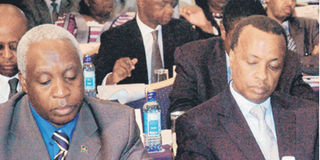Envoys meet to fine-tune foreign policy in new constitutional era

FILE | NATION
Ambassador Patrick Wamoto (left), who is now the acting Foreign Affairs permanent secretary, and Ambassador Harry Kathurima (right) to Germany follow proceedings on the second day of the Kenyan Ambassadors and High Commissioners 15th Biennial Conference at the Leisure Lodge Resort.
The need to align Kenya’s foreign policy with the new Constitution has taken on a new urgency as the country explores the possibilities of opening new missions abroad.
The Constitution has expanded the role of the Foreign Affairs ministry which will now handle the country’s foreign affairs and foreign policy, as well as international trade, previously the responsibility of the Department of External Trade in the Trade ministry.
As economic diplomacy become more important, the need to increase the country’s presence and representation across the globe is not only necessary but urgent.
Under consideration for new missions are Angola, to which Kenya Airways has increased its flights, Turkey, Poland, Hungary, and several countries in Central and South America.
Acting Foreign Affairs permanent secretary Patrick Wamoto told the Sunday Nation that these sites were very promising. “We are not there yet, but we are considering them seriously.”
In addition, foreign policy formulation, which was essentially a function of the Executive, will now be shared with the Legislature.
Parliament will now vet nominees to serve as envoys as well as the Cabinet secretary––formerly the minister––and the principal secretary in the foreign affairs department.
In light of these changes, the ministry of Foreign Affairs has assembled all the country’s ambassadors and high commissioners at the Leisure Lodge Resort on the South Coast for two weeks from today for the 16th Biennial Conference of the Envoys.
“When they met in 2009, there was no new Constitution, but the debate was on. We are now meeting after the Constitution has been promulgated. This is a Constitution that envisages far-reaching changes in our governance structures and the way we do our business,” Mr Wamoto said.
Among the issues the envoys will have to contend with are leadership and integrity, which are discussed at length in the Constitution, and the very extensive Bill of Rights.
Furthermore, the Constitution now allows Kenyans in the diaspora to vote in elections, a new phenomenon the foreign missions will have to contend with.
“These are issues I would say are new and which the ambassadors need to understand,” said Mr Wamoto.
A team of local and foreign experts drawn from diverse public and private sector backgrounds have been invited to facilitate discussions in various important areas.
Among the local experts are Charles Nyachae, head of the Commission for Implementation of the Constitution, Abdikadir Mohammed, chair of the Parliamentary Committee on Implementation and Mutakha Kangu, chair of the Task Force on Devolution.
The team will take the envoys through the progress of implementation because these are issues that come up in their day-to-day interactions with their respective countries of accreditation.
Of major concern for the envoys is the changing environment of foreign policy formulation. Under the old constitution, foreign policy formulation was essentially a function of the Executive, but Parliament has a major role under the new charter.
After the 2012 General Election, there will be no ministers sitting in Parliament, and the conduct of the foreign policy will take on a whole new dimension.
“There are very major implications for us as a foreign office. Whereas in the past formulating foreign policy was left to men in grey suits sitting behind closed doors and coming up with write-ups, now it is more or less a legislative function,” Mr Wamoto said.
Now every treaty the country ratifies becomes part of the law of the land, which was not the case before.
The ministry of Foreign Affairs is normally on the front line of negotiating those treaties. The PS notes that Article 2 (6) now makes treaty negotiations a consultative and intense affair to ensure that whatever is negotiated is in conformity with what the country wants.
“We don’t want to append our signature to a treaty which is inconsistent with the Constitution or the beliefs of our people,” he said.
Furthermore, the chapter on devolution also has implications on the foreign policy.
The need to understand how counties will relate to the centre, which retains the function of guiding the country’s foreign policy, is crucial.
For instance, will the counties be able to establish their own arrangements with foreign entities.
There will be some areas where the counties will need twinning arrangements with other entities in foreign countries, and the missions abroad will be called to assist.




